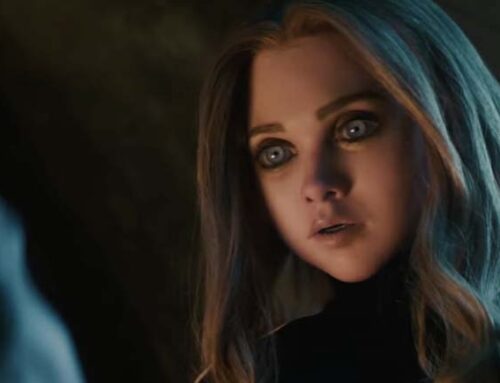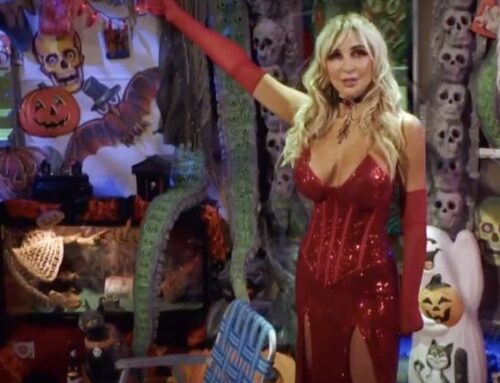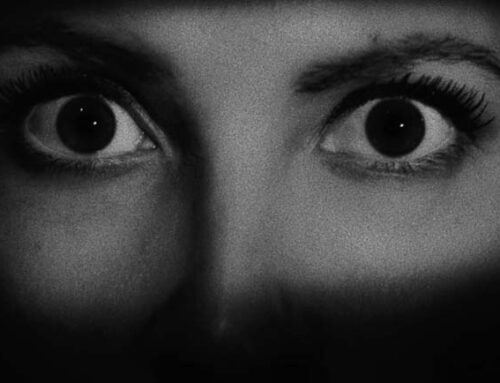Stuart Ortiz made a name for himself in the horror genre with the Grave Encounters found footage films. His latest work, Strange Harvest: Occult Murder in the Inland Empire, uses a faux documentary story to detail brutal and grisly murders, committed by a mysterious killer named Mr. Shiny. While the film certainly has shock value, as crime scene images flash across the screen, Ortiz’s latest is a clever commentary on the culture’s obsession with true crime.
We recently spoke with Ortiz and stars Peter Zizzo, who plays Det. Joe Kirby, and Terri Apple, who plays Det. Alexis Taylor. The film will make its world premiere at Fantastic Fest 2024 on September 22, 2024 at 11:50 p.m. CT.
This interview was edited slightly for clarity.
Stuart, what made you want to film a faux true crime documentary? Is it simply because of the culture’s obsession with serial killers?
Stuart Ortiz: In my first film, Grave Encounters, which is a found footage film, we had a little bit of documentary elements in that. I always thought it was a cool approach to a horror movie and a horror story that I haven’t seen utilized that much. It was always on my mind, trying to return to that and do something that was a documentary horror movie.
During COVID, Tiger King came out. It was a phenomenon. Tiger King, at its core, is basically a true crime story. Even though it has all this other silly stuff, it’s basically a true crime story. It occurred to me that true crime was huge and everywhere. It wasn’t just a small thing. It really had legs.
I was also very influenced by True Detective. I’ve always been a fan of police procedurals. When you inject a bit of weird, uncanny, otherworldly stuff, it’s perfect for me. It’s up my alley creatively.
The Mr. Shiny character was kind of a conglomeration. Some of the Zodiac Killer is in there. His motivations are not the more conventional. Our killer in the film has his own motivations that are otherworldly. He’s obsessed with this mythology and a cult element. If I had to say there were any serial killers [that influenced the film], probably David Berkowitz, the Son of Sam killer. He thought he was talking to some entity. There was this guy, Herbert Mullin, who killed because he thought an earthquake would destroy the world if he didn’t. These were guys who were driven by a higher purpose in their minds. I kind of used them as examples.
Peter and Terri, can you talk about playing these two detectives and also how you dealt with subject matter that’s so heavy, and at times, shocking?
Terri Apple: It was very interesting because I get freaked out by this kind of thing, even though I watch a lot of it. When I was a kid, my father owned a building, and they had Halloween there. I never went through the haunted house. It freaked me out. My dad took me to meet all the actors in character. Then, he finally convinced me to go through the house, which was a four-story building. It was such a funny thing. I thought I could do this character. That’s what got me onto set.
I realized it looked really realistic, but I have a big empathy for this. I’m also fascinated by serial murders and the genre in general. From that perspective, I always thought if I wasn’t an actor, I would have loved to have been someone who helped solve serial murders in real life.
In general, I liked playing her [Det. Alexis Taylor] as real as possible. That was her passion, to get to the bottom and solve this because of her childhood and her background.
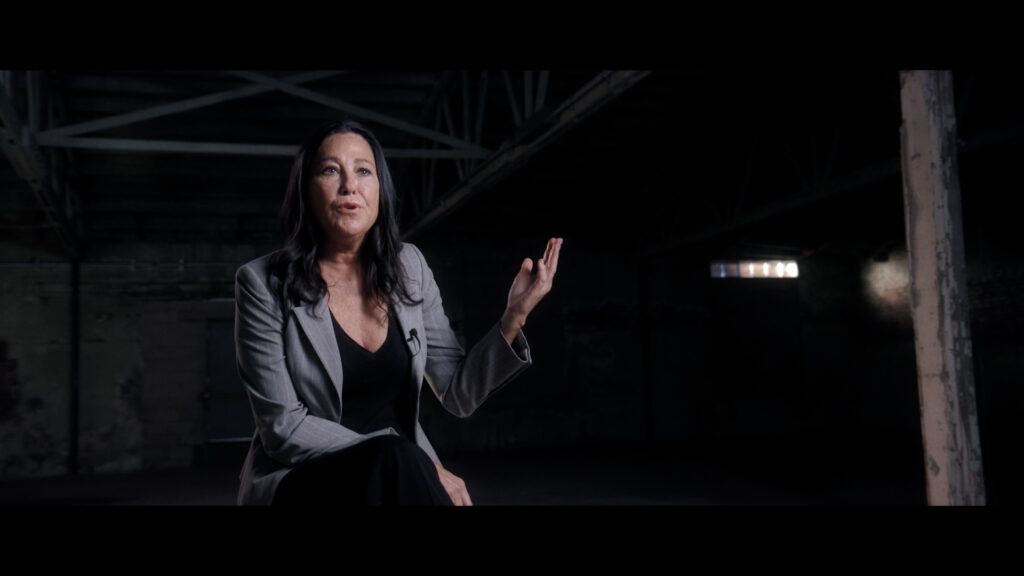
Peter Zizzo: Like Stuart and Terri, I’m already a big fan of the genres, both horror and true crime. I immediately was drawn to the approach to this film and wanted to bring as much realism to a character that requires the buying in of the viewer.
My therapist knows a retired New York City homicide detective. I got on the phone with him a couple of times and had him tell me stories. I really paid attention when he described some horrific things. There was a certain grace about the guy and a certain empathy that somehow came through this matter-of-fact way he’d describe really horrible things. I thought it was a great lens to view my character through. You can see behind his eyes that there’s a lot of sorrow.
Stuart really specified that he wanted micro expressions. I thought it was a cool thing for me to bring to this character. It wasn’t just me sitting there, running lines in a suit. It also led me to work on my voice a little bit.
There’s a moment in the film when a victim’s mother says that the names of serial killers become infamous, but too often, we forget the victims. Does anyone want to comment on that powerful concept?
Stuart Ortiz: I think that is completely true. That’s just the reality of the times we live in. There’s been a fascination with these killers. It’s a sad truth that their victims are lost in the shuffle. They become numbers and faceless names. It’s a tragedy. It was important in this to highlight the victims. They couldn’t be left out or on the sidelines.
Terri Apple: I worked with Find the Children about 20 years ago. I went into schools to talk about missing kids. It really always has been a personal passion. I do think the police need a stronger thorough thread to connect these victims and to give these victims a platform. It is true that serial killers get a bigger name. We’re desensitized now. I think it’s important to emotionally connect with the families.
When I walk in on that family, in the beginning of the movie, it’s real. It does happen. It’s a real family. It’s a true component.
Peter Zizzo: Typically, in life, when you hear about something horribly tragic, one of the things you’ll say is, God, I can’t imagine what that must be like. With most horror films, you don’t have to imagine. They show you the kills and the horror all the time. With this film, you have two level-headed narrators that walk you through these unbelievable, horrific things. I think it involves more empathy and more shock when you imagine what it must have been like. You just see the end result.
Terri and I, our characters, talk to you calmly about how their blood was drained. You can see it really bothers us, but you don’t see it happen. You hear about it, and in a way, that’s almost doubly effective. It’s a great approach to a horror film.
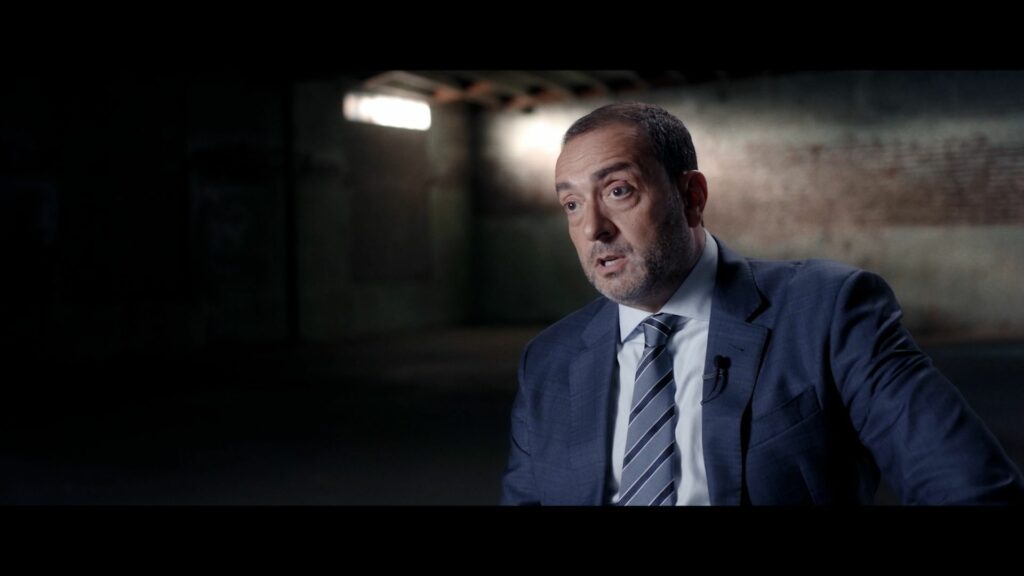
It feels like each murder case we learn about is more brutal than the last. Can you talk about filming some of those gruesome scenes?
Terri Apple: I want to jump in from a woman’s perspective and from the character’s perspective. I thought I wasn’t going to be able to handle it. Stuart and I had a conversation about it. I told him I couldn’t do it. The character could do it, but I can’t do it. Peter had no problem with it. [Laughs]. I was freaked out for a very long time. I kept saying that I can’t. I realized I’d have to be on set with this in actuality. It’s not play acting. You’re recreating. It was so life-like on the set.
I have to tell you I was extremely surprised by the brilliance of the way Stuart set it up. Yes, it’s brutal, but guess what? These murders are freakin’ brutal. It was really weird, but this is the reality of what goes on. I played a character who has a real problem with it, but her passion of solving it was greater. That’s my own perspective, as someone who was so nervous about doing it.
Stuart Ortiz: It was a pivotal thing to try to get the realism right. Tom Savini, a famous make-up artist who did Friday the 13th, Dawn of the Dead, and all of these amazing movies, would talk about how you just know when it’s right and when it looks right. I can’t exactly say what that barometer is for me, but when we set up the bodies and crime scenes, I tried to go for the realism and not have it be more of a Hollywood thing, where it’s cleaner and more presentational with a dead body. It was about the awkwardness and trying to capture the reality of death as closely as we could.
Peter Zizzo: We did a screening in Beverly Hills. Some of the people who came out to support me are my friends, but they don’t necessarily want to see gore and violence. It’s a real testament to the way the film handles it. For them, it was a lot, but they still loved the movie. You have these shots, snippets, and flashes of something. It doesn’t linger enough where you get up and walk out. The film handles it deftly. For those repulsed by violence and gore, I think they can handle this. What I come away with is the story. I think that’s why people that doesn’t necessarily gravitate towards the kill count will also be good with this. It’s just the right amount to freak you out, but it doesn’t feel exploitative.
Terri Apple: With all these really gory movies that we do watch, like Friday the 13th, you’re actually watching people be murdered. Here, we walk into scenes post. This is a different perspective.
Stuart Ortiz: Mostly what you see are things in the aftermath and examine crime scenes after things have happened. I think that’s why true crime is so popular. It gives people who listen to it or watch it a context and safe space to experience these horrible things. It’s always with commentary. Your hand is held through the whole thing. Usually, it’s something that happened in the past. It’s not a direct threat now.
I think that helped us with our film. Even though we do have horrific crime scenes and violence, it’s always with the examination and lens of a true crime documentary. Like Terri is saying, it helps people and lessens the blow. It’s a sugar with medicine kind of thing.
Strange Harvest: Occult Murder in the Inland Empire will make its world premiere at Fantastic Fest 2024 on September 22, 2024 at 11:50 p.m. CT.


